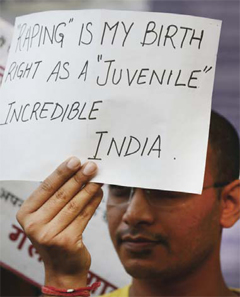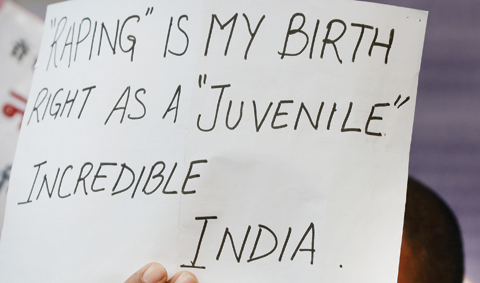 An Indian protester holds a placard during a demonstration against the release of a juvenile rapist in New Delhi yesterday. — AFP
An Indian protester holds a placard during a demonstration against the release of a juvenile rapist in New Delhi yesterday. — AFPNEW DELHI: India's Supreme Court yesterday rejected an appeal against the release of the youngest convict in a fatal gang-rape, sparking fury from the victim's parents who said the ruling was a betrayal of women. Amid growing outrage at the freeing of the 20-year-old, judges said there were no legal grounds to allow a petition by the Delhi Commission for Women, which wanted to reverse his release from a youth correctional facility.
At a hearing presided over by Justice AK Goel and UU Lalit, the court said "there is nothing in the law" that would allow them to order him back behind bars and he therefore could not be detained any longer. The ruling was greeted with despair by the parents of the victim, 23-year-old Jyoti Singh, who has become the symbol of the plight of women in a country with frightening levels of sexual violence.
The father of a student who died after being gang-raped said the family had been failed by Indian justice. "What can I say? There are no words to describe our disappointment," Badrinath Singh, the father of the victim Jyoti Singh said. "We don't understand all these laws. We only know that the system has failed us." Her rape and subsequent death from internal injuries three years ago sparked some of the biggest demonstrations in India's recent history, which intensified after being broken up by heavy-handed police tactics.
It also triggered deep soul-searching about the treatment of women in a country where rape victims are often stigmatized and frequently pressured by police and relatives to drop allegations. "There are no words to describe our disappointment," her father Badrinath Singh said. "We don't understand all these laws. We only know that the system has failed us." The convict, who cannot be named for legal reasons, was one of a group of six who abducted the young physiotherapy student after she had spent an evening at the movies with a male friend.
They lured her onto an off-duty bus and then took it in turns to rape her and violate her with a metal rod before throwing her onto the road. She died of her injuries nearly a fortnight later in a Singapore hospital. One of the six committed suicide while on remand and the other four adult attackers were given the death penalty, although the sentence has yet to be carried out pending an appeal.
'Licence to rape'
The youngest of the convicts was sent to a juvenile correctional facility for a three-year term-the maximum allowed under Indian law. Jyoti's mother, Asha Devi, said Monday's ruling showed India had "not learned any lessons from this case" and urged Prime Minister Narendra Modi to introduce laws with tougher sentences for sex attacks. "They have basically handed young criminals a licence that says before the age of 18 you can rape girls, do whatever you want, because our laws do not have any provisions to punish you," she said. "They only care about men... women are only betrayed, like they always have been."
Both parents were briefly detained on Sunday after police broke up a protest against the release on security grounds. But they attended a fresh demonstration Monday near parliament that drew crowds from far and wide. "Modi is our prime minister and I have just one question for him: 'If a case like my daughter's is being ignored, then what kind of murder, what kind of a rape, will it take for the law to be changed?" the mother said as she arrived at the rally. Some protestors wore T-shirts with slogans such 'Hang the Rapist' while others carried placards with drawings of a noose.
Vikash Sharma travelled from the neighboring state of Haryana to show his solidarity with the parents. "He should at least have been given life imprisonment," Sharma said. "The law must be amended to send the message that those who commit heinous crimes can't get away with it if they are minors." News that he had been freed from the correctional facility and was now being sheltered by a charity was only revealed on Sunday when the juvenile justice board signed his release papers. However police sources said he was in fact handed over to the charity-which has not been named over fears of an attack on its premises-on December 9. Under Indian law, the victim of a sex attack cannot be named but the parents last week called for people to use Jyoti's name in a bid to end the stigma often attached to victims.- Agencies











